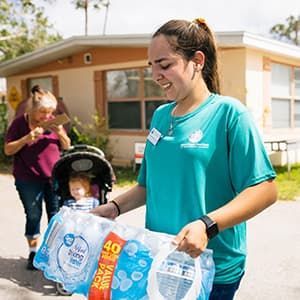
Whether it’s a wildfire like the recent tragedy in Maui, a hurricane, a tornado or any other disaster – the Feeding America network of food banks are there before, during and after a disaster strikes. In fact, when we activate in times of disaster, we are one of the nation’s largest disaster-relief organizations .
Learn how we respond to disasters to help ensure that our neighbors have the resources needed to not only survive, but thrive after skies have cleared.
Before a disaster strikes…
Proactive preparation for a disaster is a critical part of our response. We work with food banks and partner agencies when skies are clear – outside hurricane season, for example – to place and store emergency food supplies across the country that can be quickly deployed in case of a disaster. With more than 2,400 trucks across the Feeding America network of food banks, we can quickly deliver disaster relief supplies to the communities that need them most when a disaster does happen.
During a disaster…
Working with communities most impacted by a disaster, we help them gain access to emergency food, water and supplies. When Hurricane Ian devastated the Gulf Coast of Florida in
Feeding America also coordinates with national disaster relief partners like FEMA, the American Red Cross, Salvation Army and many more to provide access to equipment and supplies in affected communities as a disaster unfolds and immediately after.
We know that people facing food insecurity are often the hardest hit by a disaster. That’s why we work with partners like the Institute for Diversity and Inclusion in Emergency Management to identify neighborhoods and communities of color in historically underserved communities to help them gain access more quickly to emergency food and supplies.
As the community recovers…
In the days, weeks, months and years after a disaster, food banks, agency partners, meal programs and more remain in the community and work alongside its residents to support recovery efforts – long after other organizations have moved on.
Learn more about which disasters we're responding to and how you can help.

